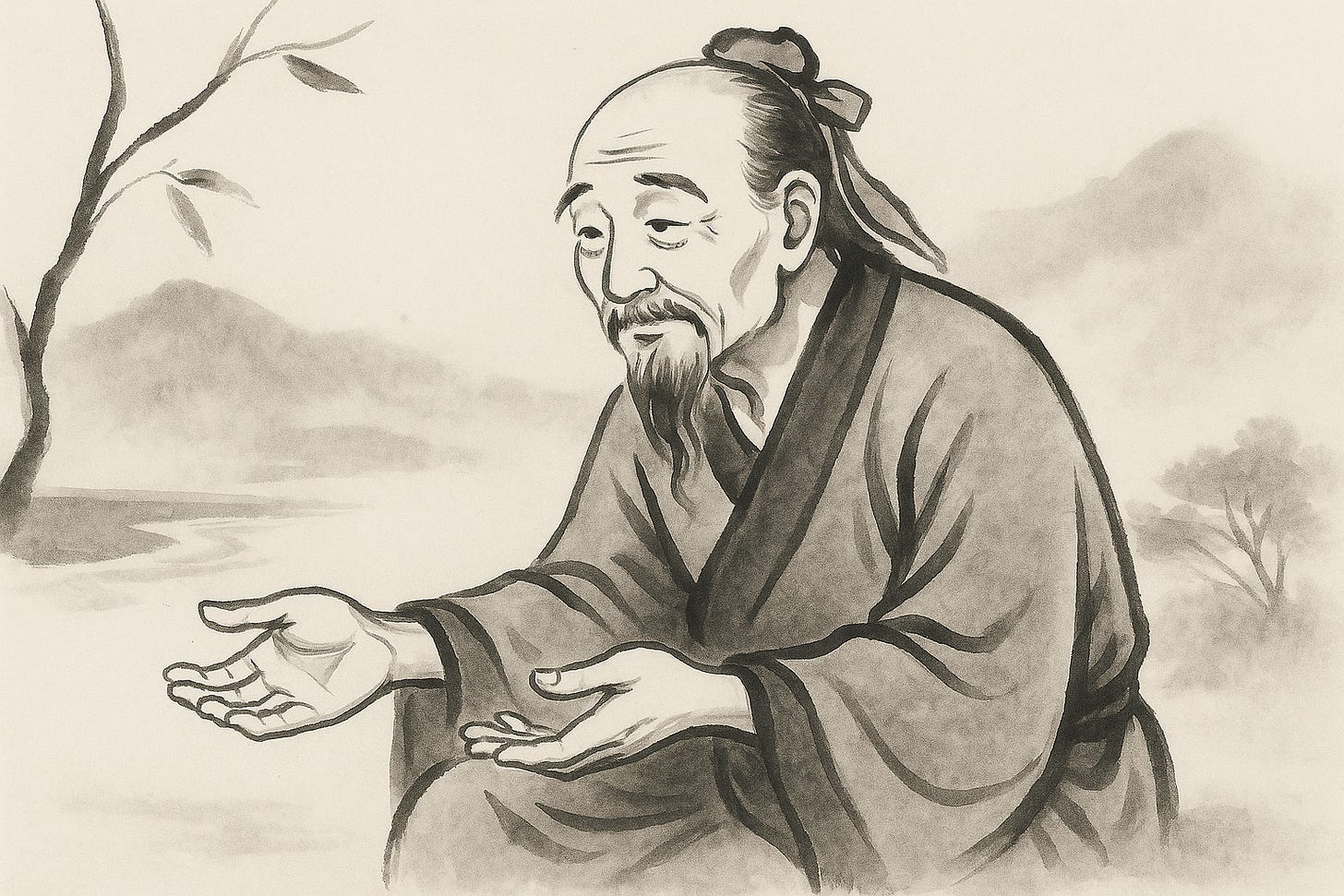The Zhuangzi is one of the world’s greatest literary and philosophical treasures.
Against our contemporary obsessions, Zhuangzi invites us to discover another way of being in the world.
It is not a book of doctrines or moral prescriptions, but a collection of stories, images, and paradoxes that unsettle our habits of thought and invite us to loosen our grip on certainty.
The following reflections explore some of its most important teachings.
The Useless Tree
“This wood is good for nothing. Make boats with it and they’ll sink; make coffins with it and they’ll quickly rot; make tools with it and they’ll quickly break. This is a worthless tree — there’s nothing it can be used for. That’s why it’s grown to be so old.”
The Zhuangzi begins with a provocation: a tree that has survived precisely because it was useless. A carpenter sees it, scoffs at its twisted trunk, and leaves it standing. But this so-called uselessness is what grants it longevity, freedom, and peace.
In our age, where every hour must justify itself with results, every life with achievements, the image unsettles us. We measure ourselves by productivity, by visibility, by what we can “offer.”
Yet what if true value lies elsewhere? What if, like the tree, our worth cannot be reduced to usefulness?
There is a kind of freedom in not fitting the measure. The tree grows according to its own rhythm, unshaped by the axe. And perhaps we too can discover a life beyond performance: a space where contemplation, rest, and simple being are not failures, but quiet forms of strength.
Calm Knowledge
“Those who mastered the Way in ancient times nourished knowledge by calmness. When it developed, they didn’t use knowledge to contrive; this is called using knowledge to nurture calm.”
The modern world prizes expertise. We are trained to accumulate information, to sharpen our skills, to stay always “ahead.” Yet the Zhuangzi suggests that knowledge, at its deepest, arises from stillness rather than effort.
This is not ignorance, but a clarity that comes from listening. Like a child who learns to speak without formal instruction: simply by dwelling among voices, our truest learning is absorbed rather than forced. It emerges when we quiet the turbulence of ambition and rest in what is.
Zhuangzi contrasts contrived intelligence with tranquil knowing. One agitates, calculates, and exhausts itself; the other waits, observes, and allows things to reveal themselves. True insight is not the fruit of control, but of receptivity. To practice calm knowledge is to let silence teach us, to let the world unfold without hurry.
The Butterfly Dream
“Once, Zhuang Zhou dreamed he was a butterfly — vividly, vibrantly a butterfly, delightedly doing as it pleased. He wasn’t aware of himself as Zhou. Suddenly he awoke and was plainly Zhou. He wondered whether it was Zhou dreaming of being a butterfly or a butterfly dreaming of being Zhou.”
Few passages in world literature are as haunting as the butterfly dream. In it, the boundary between self and world, man and butterfly, waking and dreaming, dissolves into mystery.
We live in a culture obsessed with identity. “Who am I really?” becomes the question beneath so many of our anxieties. But Zhuangzi suggests that the self is not a fortress to be secured, but a current in motion. We are transformations, always shifting, never fixed.
Instead of clinging to a “true self,” the dream invites us to embrace our metamorphoses. Today a student, tomorrow a parent, later a wanderer — none is final, yet each is true while it lasts. The self is not a single, solid fact, but a flowing process.
When we realize this, life becomes lighter. We stop fighting change, and instead inhabit it with the ease of a butterfly’s wings.
The Genuine Person
“Common people value gain; the conscientious value reputation; worthies esteem ambition; sages respect vital essence. One who can embody unadulterated simplicity is called a genuine person.”
In a time when every gesture is curated, every profile carefully managed, Zhuangzi offers another vision: the zhen ren — the genuine person. This figure is not defined by status or image, but by inner simplicity.
To be genuine is not the same as the modern slogan “be yourself.” It is deeper, quieter, more demanding. It is to act without hidden motives, to live without self-display. The genuine person does not need to prove or perform, because their presence is already aligned with the Way.
Zhuangzi writes that true sadness needs no cry to awaken grief, true affection no smile to create harmony. The genuine person influences not by effort, but by resonance. Their being radiates, not their performance.
In a culture obsessed with branding, this is revolutionary: effectiveness that comes not from technique, but from purity of spirit.
Effortless Action
“The Way is constant in non-action, yet there is nothing it does not do. If the sovereign can hold to this, all things will transform themselves.”
At the heart of Daoist thought is wu wei — non-action, or more precisely, effortless action. This is not passivity, but a way of acting in harmony with the flow of things.
Water does not struggle against rock, yet in time it carves valleys and shapes mountains. In the same way, we can accomplish much without straining, if we learn to sense the right moment — when to act and when to wait, when to persist and when to let go.
The paradox is that by relinquishing control, we become more effective. Often, it is when we stop forcing outcomes that the right doors open. Wu wei is a practice of trust: in the rhythms of life, in the unseen currents that guide us, in the Way itself.
To live by effortless action is to move like water — soft yet unstoppable, patient yet powerful.
With gratitude,



I love these posts. I gain so much from them. Thank you!
Beautiful and interesting. Thank u